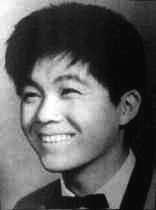Kyu Sakamoto has the distinction of being the only Japanese artist to ever scored a top international hit. His song Ue o muite arukō 上を向いて歩こう (”I Look Up When I Walk”; Sukiyaki in the West), sung completely in Japanese and against all odds, reached #1 in the US Billboard charts in 1963. The music was written by Hachidai Nakamura. It is said that Rokusuke Ei wrote the touching lyrics after his heart was broken by actress Meiko Nakamura. The lyrics tell the story of a man who looks up while he is walking so his tears would not fall. It is interesting to note that Sukiyaki is not even mentioned in the song ; the West just needed something that was easily pronounceable and associated with Japan.
In later years, Kyu Sakamoto dedicated his life for the caring of the elderly and the young and handicapped people in Japan. His other best known and most beloved song is Ashita ga Aru Sa 明日があるさ (“There’s Always Tomorrow”), which was the leading theme of the 1964 Handicap Olympics in Tokyo.
EMI (UK), 2005: Kyu Sakamoto Memorial Best
Miagete Goran Yoru no hosi wo; Sukiyaki; Ashita Ga Arusa; Kanashiki 60sai; Good Timing; Kyu-Chan Zuntatta; Kyu-Chan Ondo; Boku No Hoshi (My Star); Hitoribocchi No Futari (The Lonesome Two); Tokyo Gorin Ondo; Shiawasenara Tewotatako; Sayuonara Tokyo; Yoakeno Uta; Tomodachi; Namidakun Sayuonara; Lets Kiss (Jenka); Sekaino Kunikara Konnichiwa; Otonano Douwa Imadakara Iukeredo; Kokorono Hitomi; China Night.
Capitol Records, 1963: Sukiyaki and Other Japanese Hits
Ue o muite arukō (Sukiyaki); Tsun Tsun Bushi (The Tsun Tsun Song); Hitoribocchi No Futari (The Lonesome Two); Kyu-chan Ondo (The Kyu-Chan Folk March Song); Mo Hitori No Boku (It’s Just Not the Real Me); Good Timing; Boku No Hoshi (My Star); Kiminanka Kiminanka (I Couldn’t Care For You, Not You, Not You!); Kyu-chan No Zuntatatta (The Zuntatatta Song); Hige No Uta (My First Whisker); Goodbye, Joe; Anoko No Namaewa Nantenkana (I Wonder What Her Name Is).
(上を向いて歩こう SUKIYAKI)
上を向いて歩こう
Ue wo muite arukou (Looking up while walking)
涙がこぼれないように
Namida ga koborenai youni (So the tears won’t fall)
思い出す春の日
Omoidasu haru no hi (Remebering those spring days)
一人ぼっちの夜
Hitoribocchi no yoru (All alone at night)
上を向いて歩こう
Ue wo muite arukou (Looking up while walking)
にじんだ星をかぞえて
Nijinda hoshi wo kazoete (And counting the scattered stars)
思い出す夏の日
Omoidasu natsu no hi (Remembering those summer days)
一人ぼっちの夜
Hitoribocchi no yoru (All alone at night)
幸せは雲の上に
Shiawase wa kumo no ue ni (Happiness lies above the clouds)
幸せは空の上に
Shiawase wa sora no ue ni (Happiness lies above the sky)
上を向いて歩こう
Ue wo muite arukou (Looking up while walking)
涙がこぼれないように
Namida ga koborenai youni (So the tears won’t fall)
泣きながら歩く
Naki nagara aruku (Keep walking on, while crying)
一人ぼっちの夜
Hitoribocchi no yoru (It’s a lonely night)
思い出す秋の日
Omoidasu aki no hi (Remembering those autumn days)
悲しみは星の影に
Kanashimi wa hoshi no kage ni (Sadness is in the shadow of the stars)
悲しみは月の影に
Kanashimi wa tsuki no kage ni (Sadness is in the shadow of the moon)
上を向いて歩こう
Ue wo muite arukou (Looking up while walking)
涙がこぼれないように
Namida ga koborenai youni (So the tears won’t fall)
泣きながら歩く
Naki nagara aruku (Keep walking on, while crying)
一人ぼっちの夜
Hitoribocchi no yoru (It’s a lonely night)
一人ぼっちの夜
Hitoribocchi no yoru (It’s a lonely night)





 Posted by franas
Posted by franas
You must be logged in to post a comment.